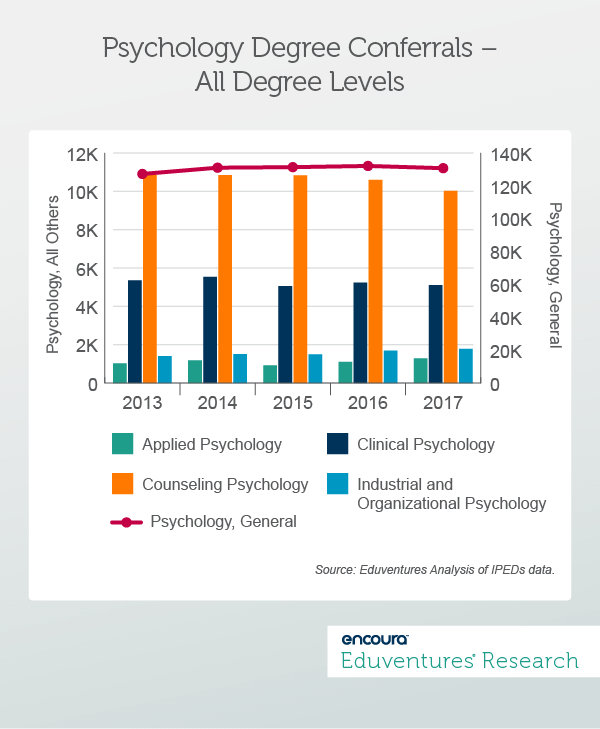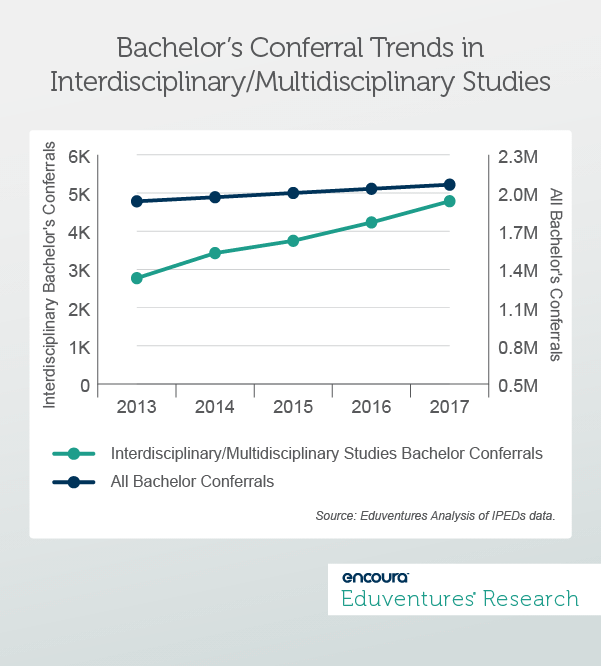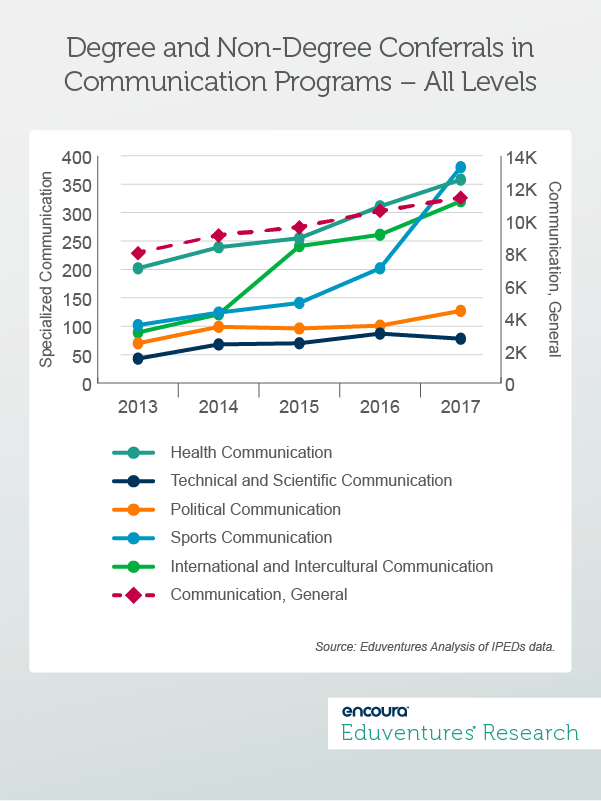Drawing on Eduventures’ 20-plus years of experience helping universities develop, launch, and assess academic programs, the Program Spotlight Series of Wake-Up Calls calls attention to best practices in program development.
In recent years, we have seen increased student interest in programs with strong career articulation. Eduventures data suggests that this interest comes at the expense of more traditional programs often housed in schools of arts and sciences. Programs like English, psychology, and history have fallen out of favor, while healthcare, business, engineering, and computer science have enjoyed rising popularity.
Is this bad news for schools of arts and sciences? Not necessarily.
Non-Licensure Psychology
Why it matters: Interestingly, one of the most common questions we received from colleges and universities this year was around psychology programs. These requests came with a twist. Institutions wanted to better understand the viability of psychology degrees that would not lead to careers in clinical psychology or therapy. Rather, they focused on areas such as applied, consumer, industrial, or organizational psychology.
The data suggests that these institutions are on to something. Figure 1 illustrates that while the majority of psychology degrees are still conferred in general psychology, these conferrals have recently experienced a downward trend. Conferrals in clinical and counseling psychology have also declined. The market for applied psychology, industrial psychology, and organizational psychology, however, is comparatively small, but has experienced recent growth.

Prognosis: According to Eduventures’ Prospective Student Survey, psychology remains among the top majors of college-bound high school students. The bachelor’s in psychology remains a versatile degree that offers opportunities for careers in human resources, data analysis, higher education administration, and many other fields.
Graduate study in this discipline offers opportunities in business and other fields outside of counseling. We believe psychology graduates may be forgoing plans to become therapists or counselors in favor of more easily-attainable careers in business and industry. As long as unemployment remains low, we predict this trend will continue.
Interdisciplinary Studies
Why it matters: While students have become increasingly focused on programs of study with strong alignment to what they perceive as lucrative careers, we’ve observed a counterintuitive increase in student demand for interdisciplinary studies. A closer look at this program area reveals that it is often geared toward adult learners, offering working professionals a degree path that can be entirely customized to their past experiences and desired outcomes.
Interdisciplinary programs that target the traditional-aged student population also emphasize a customized approach to students’ interests and a multi-pronged approach to gaining skills sought after by employers. As Figure 2 shows, bachelor’s degree conferrals in multi/interdisciplinary studies have grown by 15% (CAGR) between 2013 and 2017, compared to 1% growth for all bachelor’s programs over the same period.

Prognosis: Bachelor’s programs in interdisciplinary studies offer an attractive option for professionals who possess experience and knowledge within their respective industries or roles but need a formal credential. This program is also attractive to students who are focused on gaining career skills that can be applied to a variety of industries.
The ability to tailor their educational journeys to their needs offers benefits beyond flexible class schedules or delivery modes. We expect to see the growth trend illustrated in these programs to mirror the increase of career-focused learners.
Specialized Communication
Why it matters: Communication programs are still going strong in schools of arts and sciences. Conferrals in generalized communication programs have steadily grown between 2013 and 2017. Much of this growth can be attributed to continued interest among undergraduate students. Communication degrees offer versatile employment opportunities in business, public relations, marketing, and other fields, making it a popular choice for students who want to keep their options open.
But we’ve also noticed another, related trend. While the total numbers are still small, degree and certificate conferrals in specialized communication are also on the rise (Figure 3).

Conferrals in health communication, sports communication, and international and intercultural communication in particular have experienced steep growth between 2013 and 2017. Many of these were awarded at the non-degree certificate level, but the overall growth indicates a growing interest among students—and potentially employers—in communication skills that are specific to an industry.
Prognosis: Written, verbal, and digital communication skills, in addition to critical thinking and both quantitative and qualitative methods of inquiry, are key elements of communication programs in schools of arts and sciences. These so-called soft skills are also sought after by many employers. Communication specific to a growing industry may offer a new pathway for students to enter this industry with skills relevant to employers.
We don’t predict these programs will become large and mainstream, but we do believe we will see further growth in this area.
The Bottom Line
What do these three programmatic areas have in common? Each, in its own way, makes a crucial and clear connection to the labor market. These programs, while often found in schools of arts and sciences, prepare graduates to enter the workforce with well-rounded educations and the skills (or credentials) employers are looking for. While students and parents increasingly question the return-on-investment of academic programs that are not directly linked to careers, these examples demonstrate that more traditional programs can also be career-focused.
Know someone who could use a weekly analysis of higher education research, news and survey data, as well as industry events, and insider perspectives? Then click the link below and share the Wake-Up Call with friends and colleagues!
Thank you for subscribing!
Thank you for subscribing!

